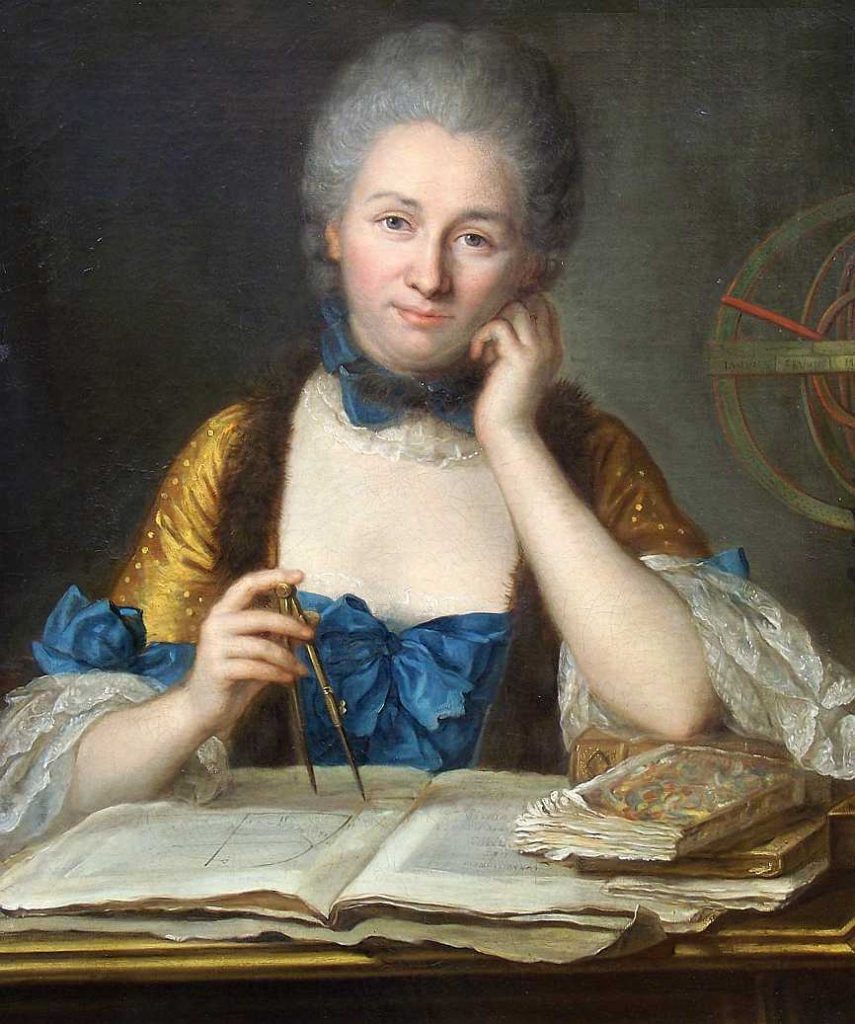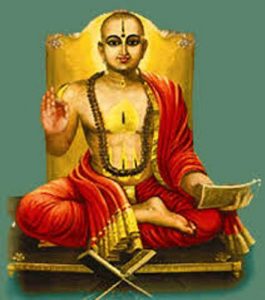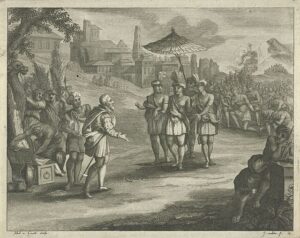In the early Eighteenth Century, intellectual themes were not part of women’s duties, and it was frowned upon for women to research and question. That is why it is so extraordinary that Émilie du Châtelet, a French woman, became a mathematician and scientist. Voltaire told the king of Prussia, Frederick the Great, in a letter that Châtelet was “a great man whose only fault was being a woman.”1
In 1706, when Émilie du Châtelet was born, French society had restraints on women that men did not face, such as not having real access to education. In Early Modern France, “the state would control the fathers, the fathers would control the families.”2 However, the Enlightenment Era did bring about enough change in France so that it was possible for Châtelet to become educated and advance in her career.3 She was lucky in the fact that she had an “unusually enlightened” father who gave Châtelet such a good education. She was educated in Latin, Italian, English, Spanish, Greek, Mathematics, Astronomy, Geography, and Poetry. Her mother also encouraged her and reflected a “cultivated background.”4
Châtelet changed and influenced society through her work on mathematics and scientific works. She published an introduction to Newtonian mechanics in 1740, and she even translated Newton’s Principia into French, with comments explaining the difficult mathematics to a popular audience.5 This was significant because not only could more of the population now read the works of Newton, but because of her commentary, more of the population could now understand it. It also introduced Newton into mainstream French scientific life. She went into detail on Newton’s theory of Gravity and she recast many of Newton’s theories and results in the “more powerful and suggestive notation of…. Calculus.”6 This had a great effect on the other scientists and mathematicians of the time. Châtelet’s work helped others to understand the complicated Newtonian system. By exploring Newton’s theses, and writing them for the educated public to read, Châtelet changed France.

Châtelet was married in June 1725 to Florent-Claude, marquis du Châtelet and count of Lomont. However, after only three years with her, he left to pursue a military career and rarely visited her. This is when Châtelet began an affair with Voltaire, another lover of Math and Science.7 In order to get her works published, Châtelet had to have Voltaire co-author them with her, but only his name appeared on the front cover. Emily Grosholz writes that Voltaire had not mastered the mathematics from the Principia, but instead relied on Châtelet to “write the technical sections of the book” he was writing called Elements of Newton’s Philosophy.8 Châtelet also discussed research on the solar system, electricity, and magnetism. She had just finished her translation of the Principia, when she died of “childbirth fever,” from a scandalous pregnancy with Voltaire.9
In her unusual career, Émilie du Châtelet worked with other famed scholars and succeeded in making mathematics a language that many more people could understand. As a woman, she opened the doors for other women to follow in her footsteps and she changed the world with her concepts and understandings of these men’s topics.
- Jerry Bentley, Herbert Ziegler, and Heather Streets-Salter, Traditions and Encounters: A Brief Global History, 4th ed., vol. 2 (McGraw Hill Education, 2016), 390. ↵
- James B. Collins, “The Economic Role of Women in Seventeenth-Century France,” French Historical Studies 16, no. 2 (Fall 1989): 436. ↵
- Ruth Hagengruber, “Emilie Du Châtelet, 1706–1749: Transformer of Metaphysics and Scientist,” The Mathematical Intelligencer 38, no. 4 (December 1, 2016): 1. ↵
- Ruth Hagengruber, “Emilie Du Châtelet, 1706–1749: Transformer of Metaphysics and Scientist,” The Mathematical Intelligencer 38, no. 4 (December 1, 2016): 2. ↵
- Emily Grosholz, “Candles in the Dark: Emilie Du Chatelet and Mary Somerville,” The Hudson Review, no. 4 (2013): 669. ↵
- Emily Grosholz, “Candles in the Dark: Emilie Du Chatelet and Mary Somerville,” The Hudson Review, no. 4 (2013): 669. ↵
- Complete Dictionary of Scientific Biography, 2008, s.v. “Châtelet, Gabrielle-Émilie Le Tonnelier De Breteuil, Marquise Du.” ↵
- Ruth Hagengruber, “Emilie Du Châtelet, 1706–1749: Transformer of Metaphysics and Scientist,” The Mathematical Intelligencer 38, no. 4 (December 1, 2016): 2-3. ↵
- Emily Grosholz, “Candles in the Dark: Emilie Du Chatelet and Mary Somerville,” The Hudson Review, no. 4 (2013): 669. ↵



81 comments
Priscilla Reyes
Awesome article! Émilie du Châtelet was fortunate to have had supportive, AND EDUCATED parents. Because women were not able to receive an education, their family was a very important factor. I find it amazing how she was a well-rounded person, with knowledge in many subjects. She worked on translating findings, but also contributed her own. Still, I had never heard of her, but knew about Voltaire and others. Makes me wonder about other “geniuses” of science and math!
Victoria Sanchez
Talk about shattering glass ceilings!!! Cheers to one of the world’s first feminists!!! I love that your article examines societal norms that were expected of women. The quote you include at the beginning about Châtelet’s only flaw was that she was a man was the perfect quote to sum up the attitudes and expectations of women at the time. I find it interesting that the comment, and several other comments and facts made about Châtelet throughout are still–sadly–relevant in today’s modern world. The idea of Châtelet having to hide her genius behind the name of the man she loved is ridiculous! Her brain, her abilities, the brilliance and genius that she possessed have obviously been overlooked in so many history lessons and books; you did a great job of highlighting her career and her accomplishments. Great article!
Alyssa Vela
Prior to reading this article, I had never heard of Émilie Du Châtelet. , Her story really is noteworthy in my eyes. The fact that she had never gotten the recognition that she deserved really bothered me, but knowing now that she is finally receiving said recognition makes me happy. The fact that I had no idea who she was prior to reading the article shows that she still hasn’t received half of the recognition that she deserves but by writing this article you’re slowly but surely getting there. You picked a great topic and I look forward to reading more of your work!
Natalia Zuniga
Wonderful article! It is great to hear about the amazing things that women accomplished back them with how much criticism they received. I great that even though she could not receive full credit for her works back then that it now comes to light everything she accomplished. It also quite interesting she had Voltaire of all people as a lover and that he also supported her knowledge.
Nelson Smithwick
This was a great story, it was such a shame that such a great mind could be written off just because she was a woman. Women like Émilie du Châtelet,and Marie Curie did so much to advance women’s positions in science and education and allowed many women today to follow in their footsteps and pursue careers in math and science.
Jennifer Pogue
Awesome article and great title! It is crazy to think Emily was “lucky” because the had an “enlightened father” that let her go to school. It is sad to realize women at the time had to have permission to go to school. It is even worse that in 2017 there are still parts of the world where girls cannot attend school. This article reminds me to value my education.
Aaron Jaramillo
Great article Bailey! I had never heard of Émilie Du Châtelet before, but the way you told her story is great. It is amazing that Châtelet accomplished a lot in her career. It makes it that much better because at that time women didn’t get as much recognition as men did. To see her break that wall down was truly amazing.
Irene Astran
I gives props to you for adding another article to this site about a strong female figure. I can only imagine how difficult it would have been to be a woman in that time. I would have found it extremely difficult to have watched my work be published under someone else’s name. It is admirable that she set aside her pride to make sure that information was available to the public.
Nicolas McKay
What a fantastic article. I had never heard of Émilie Du Châtelet before, but her story is so incredible. She was truly a trailblazer, not just in science and mathematics but in women’s rights as well. It is a shame she was never able to get the recognition she deserved, even in today’s world not many people (myself included) know who she was, despite her many achievements. You truly picked a wonderful topic.
Teresa Valdez
Excellent work. It is astonishing that Emilie du Chatelet was able to accomplish so much in her career. I really admire her for elaborating Newton’s works so that more people could understand them. I am glad that she was born in a time that allowed her to further her education. The narrative of this article flows beautifully. I really felt engaged in the article.